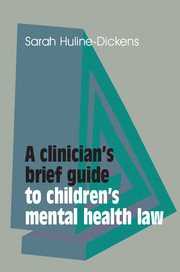Book contents
- Frontmatter
- Contents
- Foreword
- Acknowledgements
- List of cases
- Common abbreviations and terms
- 1 Introducing child mental health and the law
- 2 The rights of the child
- 3 The Children Act 1989 and the 2004 amendments
- 4 Consent to treatment
- 5 Confidentiality
- 6 The Mental Health Act
- 7 The Mental Capacity Act
- 8 Juvenile justice
- References
- Index
5 - Confidentiality
Published online by Cambridge University Press: 02 January 2018
- Frontmatter
- Contents
- Foreword
- Acknowledgements
- List of cases
- Common abbreviations and terms
- 1 Introducing child mental health and the law
- 2 The rights of the child
- 3 The Children Act 1989 and the 2004 amendments
- 4 Consent to treatment
- 5 Confidentiality
- 6 The Mental Health Act
- 7 The Mental Capacity Act
- 8 Juvenile justice
- References
- Index
Summary
Confidentiality has been a cornerstone of British medical practice for decades and traditionally has been governed by common law. That patients can trust doctors is essential to making diagnoses and suggesting treatments, and the general rule has been that information relating to patients has been disclosed only with the patient's consent. Broadly, in this respect, children and young people have the same entitlement to confidentiality as adults.
However, maintaining patients’ confidentiality, whether they are adults or children, has never been an absolute duty, and information can be disclosed without a patient's consent by law or in the public interest (discussed below), particularly when child protection is involved.
In law, doctors have an obligation to disclose information when ordered to do so by a judge or a court of law in both civil and criminal proceedings, and this includes the coroner's court. The guidance issued by the General Medical Council (GMC; 2009) gives useful information about this. Doctors can also, of course, be summoned to give evidence and can be held in contempt of court if they fail to attend.
In fact, a surprising number of regulatory bodies and statutes provide for some form of access to otherwise confidential information. These are discussed in the GMC guidance, and they cover, for example, the handling of information about certain notifiable diseases.
It may also be relevant to know briefly about two recent pieces of statute law that might affect confidentiality: these are the National Health Service Act 2006 and the Serious Crimes Act 2015.
The National Health Service Act 2006 introduced a provision (in section 251) that enables the common law duty of confidentiality to be overridden. This means that confidential patient information can be disclosed for medical purposes where it is not possible to use anonymised information and where seeking consent is not practical. The NHS Health Research Authority has established a Confidentiality Advisory Group to deal with this new function (Health Research Authority, 2015).
This piece of legislation serves to emphasise the connections between confidentiality, medical records and information governance, which is becoming an increasingly complex area.
- Type
- Chapter
- Information
- Publisher: Royal College of PsychiatristsPrint publication year: 2016

